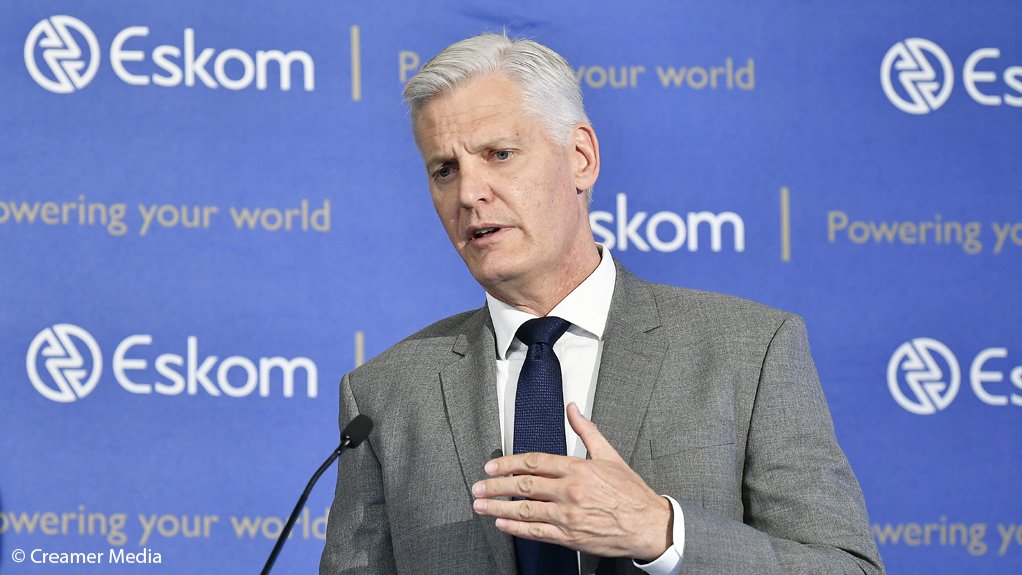Eskom CEO Andre de Ruyter has outlined the case for leveraging South Africa’s transition to green energy to reverse the country’s “vicious cycle of deindustrialisation and unemployment” and to trigger a “virtuous cycle of local demand for local goods to create investment and jobs”.
Delivering the Dr Hendrik Johannes van der Bijl Memorial Lecture during a virtual event hosted by the University of Pretoria and the South African Academy of Engineering, De Ruyter rejected the notion of South Africa abandoning manufacturing in favour of commodity exports and services.
Instead, the former Manufacturing Circle chairperson argued that South Africa should recognise the opportunity associated with its world-class “solar and wind acreage” and align itself with the “inevitable global shift to a green economy” in a way that attracts the green financing needed to stimulate the country’s reindustrialisation.
“The integration of fiscal, industrial, environmental and energy policies is necessary for this to be achieved,” he stressed.
Despite leading a coal-dominant utility – one that is also responsible for 44% of South Africa’s total carbon emissions – De Ruyter warned that persisting with coal would lead to another era of isolation and punitive trade measures.
With Eskom poised to retire 22 GW of coal-fired generation capacity over the next 15 years, however, there was an opportunity to “pivot away from Eskom’s carbon-intensive history and lay the groundwork for a cleaner and greener electricity supply industry”.
“And it is more than an opportunity, it is an economic, social and environmental imperative,” De Ruyter argued, highlighting growing reluctance among financiers to fund coal and the prospect of the implementation of trade restrictions, such as the European Union’s carbon border adjustment mechanism, on carbon-heavy products.
“Pivoting to green energy will therefore create a competitive advantage for South African exports.”
JUST ENERGY TRANSTION
Eskom itself was implementing a ‘Just Energy Transition’ (JET) strategy to accelerate the repurposing and repowering of decommissioned stations, beginning with Komati in 2022, which would include it pursuing a share of the renewable-energy allocation contained in the Integrated Resource Plan of 2019.
“With the requisite financing of around R180-billion, Eskom could build 7 400 MW of clean capacity, plus at least 244 MWh of battery storage, in the next five years alone.”
At Komati, Eskom intended to repower the facility by introducing solar photovoltaic (PV) generators supported by a 244 MWh battery energy storage solution.
“Komati is ideally positioned to be a flagship JET project to act as a ‘proof of concept’ for subsequent projects at Grootvlei, Hendrina and Camden, all of which are scheduled for retirement by 2025.”
Together with independent power producer projects, a R118-billion expansion of Eskom’s transmission grid and a R60-billion investment in its distribution network, there was “potential to drive local manufacturing capability by creating demand for renewable-energy components, and to contribute to the establishment of new factories”.
South Africa, De Ruyter argued, should aim to introduce local manufacturing of wind turbines, gas turbines, batteries, solar frames, gantries and plate glass.
However, its local-content strategy should be alive to competitive pressures and South Africa should be wary, for instance, of seeking to compete with China on photovoltaic wafers.
BEYOND RENEWABLES
“Emulating the Motor Industry Development Programme, now known as the Automotive Production and Development Programme, for the production of components for renewable energy, will enable South Africa to use its own demand for new generation to catalyse a new industry.”
The opportunity to drive industrialisation was not limited to renewable-energy component manufacture, however, with the imperative to move away from carbon emissions in transportation offering another “compelling opportunity”.
There was particular potential for South Africa’s local automotive sector to transition to the production of electric vehicles (EVs), which had also become a business imperative, with 80% of the industry’s exports threatened by 2040 should the shift to EVs fail to materialise.
De Ruyter lamented ongoing constraints to the large-scale adoption of EVs locally, including the sustenance of punitive import duties, announcing that Eskom was keen to act as an anchor market for such vehicles.
“This therefore is the moment for South Africa to seize the opportunity to rebuild its industrial base by pivoting to a cleaner and greener future,” De Ruyter concluded.
EMAIL THIS ARTICLE SAVE THIS ARTICLE ARTICLE ENQUIRY
To subscribe email subscriptions@creamermedia.co.za or click here
To advertise email advertising@creamermedia.co.za or click here











